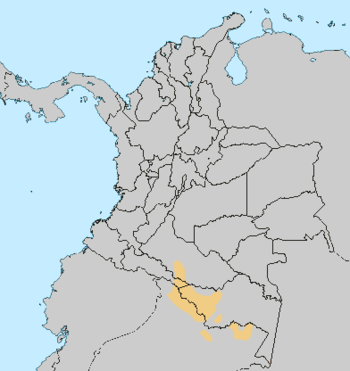- Bora–Witoto languages
-
Bora–Witóto Witotoan Geographic
distribution:northwestern Amazon Linguistic classification: Bora–Witóto Subdivisions: ? AndokeBoranWitotoan
Bora–Witóto (also Bora–Huitoto, Bora–Uitoto, or, ambiguously, Witotoan) is a proposal to unite the Bora and Witotoan language families of northeastern Peru (Loreto Region), southwestern Colombia (Amazonas Department), and western Brazil (Amazonas State). Kaufman (1990) found the proposal plausible; by 1994 he had accepted it and added the Andoque language.
Contents
Family division
- Boran (aka Bora–Muiname, Bóran, Miranyan, Miranya, Bórano)
- Witotoan (aka Huitoto–Ocaina, Huitotoan, Huitotoano, Witóto, Huitoto, Uitoto, Huitótoano)
The classification above is based on Campbell (1997) who follows Richard Aschmann's 1993 classification and reconstruction of proto-Witotoan.
Kaufman (1994) lists Bóran and Witótoan (Huitoto–Ocaina) as separate families (they are grouped together with Andoque as Bora–Witótoan; by 2007 he moved Andoque to Witotoan). He does not show internal branching. Nipode and Mïnïca are listed as dialects of a single Meneka language (whereas Aschmann and Campbell treat these as separate languages at different branch nodes). Kaufman also includes within his Witótoan (Huitoto–Ocaina) the following languages (followed by their Lingist List codes):
- Andoquero (aka Andokero, Miranya-Karapana-Tapuyo, Miraña, Carapana) Amazonas, Colombia (†)
- Coeruna (aka Koeruna) Amazonas, Brazil (†) 0o6 at LINGUIST List
- Nonuya (aka Nyonuhu, Nonuña, Achote, Achiote) Loreto, Peru [noj]
- Koihoma (aka Coto, Koto, Orejón, Coixoma) Loreto, Peru (†)
Andoquero, Coeruna, and Koihoma are all extinct. Nonuya may be extinct as well.
Synonymy note:
- The name Muiname has been used to refer to the Muinane language (Bora Muinane) of the Boran sub-group and also to the Nipode language (Witoto Muinane) of the Huitoto–Ocaina sub-group.
- The names Koto, Coto, and Orejón have been used to refer to the Koihoma language (Coixoma) and also to the unrelated Orejón language (also known as Koto or Coto) of the Tucanoan language family.
Genetic relations
Kaufman's (1994) Bora–Witótoan stock includes the Bóran and Witótoan (Huitoto-Ocaina) sub-families and also the endangered language isolate Andoque (Andoke). By 2007 he had moved Andoque to within the Witotoan branch, and included Bora–Witoto in his Macro-Andean proposal. Richard Aschmann (1993) considered Andoque an isolate.
Joseph Greenberg included Bora–Uitoto within his Macro-Carib phylum, but this has not been followed by linguists working on those families.
Bibliography
- Aschmann, Richard P. (1993). Proto Witotoan. Publications in linguistics (No. 114). Arlington, TX: SIL & the University of Texas at Arlington.
- Campbell, Lyle. (1997). American Indian languages: The historical linguistics of Native America. New York: Oxford University Press. ISBN 0-19-509427-1.
- Gordon, Raymond G., Jr. (Ed.). (2005). Ethnologue: Languages of the world (15th ed.). Dallas, TX: SIL International. ISBN 1-55671-159-X. (Online version: http://www.ethnologue.com).
- Greenberg, Joseph H. (1987). Language in the Americas. Stanford: Stanford University Press.
- Kaufman, Terrence. (1990). Language history in South America: What we know and how to know more. In D. L. Payne (Ed.), Amazonian linguistics: Studies in lowland South American languages (pp. 13–67). Austin: University of Texas Press. ISBN 0-292-70414-3.
- Kaufman, Terrence. (1994). The native languages of South America. In C. Mosley & R. E. Asher (Eds.), Atlas of the world's languages (pp. 46–76). London: Routledge.
External links
- Ethnologue:
- Proel:
Categories:- Witotoan languages
- Indigenous languages of the South American Northern Foothills
- Indigenous languages of Western Amazonia
Wikimedia Foundation. 2010.
